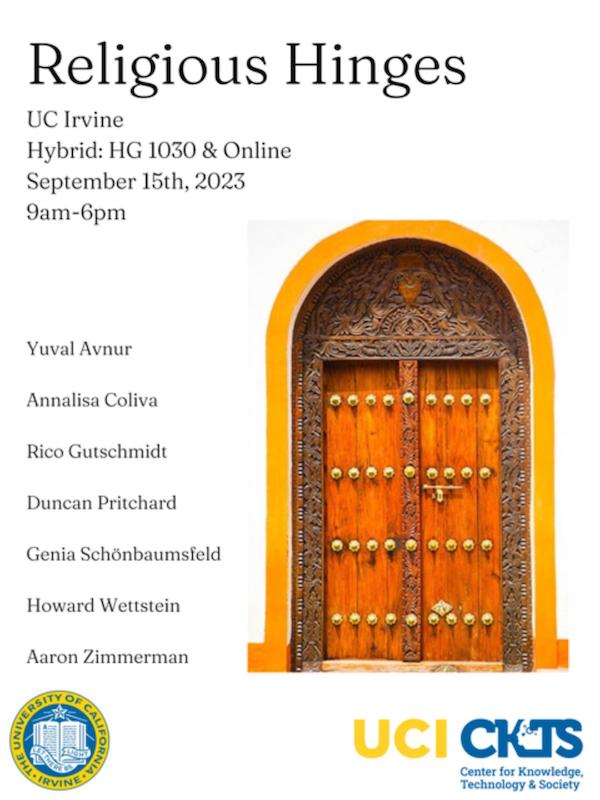
A one-day conference devoted to the application of Wittgenstein’s conception of hinge commitments to the religious life. This is a hybrid event, with some of the talks online and some of them in-person. All online talks will be screened in HG 1030. There’s no need to register to attend this event in-person—all are welcome. To attend online, please register here: https://uci.zoom.us/webinar/register/WN_PCTggNOSTqGWAYtiSF1E-g

9-9.30am Coffee/tea
9.30am Workshop welcome
Duncan Pritchard (UCI, Philosophy)
9.30-10.30am [Via Zoom]: Genia Schönbaumsfeld (University of Southampton, UK) Chair: Aaron James (UCI, Philosophy)
‘Passionate Commitment to a System of Reference’
ABSTRACT. In this paper I discuss one of the most well-known and most frequently misunderstood passages from Culture and Value – the one where Wittgenstein says that religious belief can only be something like passionate commitment to a system of reference. I argue that the notion that religious belief is more like the acceptance of a ‘hinge-framework’ than the adoption of an isolated intellectual belief has profound implications for the grammar of the word ‘God’, as well as for the question of how religious belief can be acquired. I propose that Wittgenstein’s conception can fruitfully be understood as a type of virtue-based account where the deliberative reasons that someone can have for their religious belief (Glaube) depends on the development of their spiritual capacities. This will enable us to see why passionate commitment to a system of reference, although not evidence-based in any ordinary sense, is nevertheless not just ‘brute conviction’.
10.30-11.30am [Via Zoom]: Rico Gutschmidt (University of Konstanz, Germany) Chair: Julia Lupton (UCI, English)
‘Certitudo vs. Securitas. Faith as a Form of Groundless Trust in Luther and Wittgenstein’
ABSTRACT. Wittgenstein’s notion of certainty strongly resembles Luther’s way of linking faith to the notion of certitudo as opposed to the notion of securitas. The second notion represents the human desire to secure our beliefs on our own, while the first represents an attitude of trust that acknowledges the fact that we cannot attain full control of our existence. Luther takes faith to be a matter of trust and thus of certitudo, not of securitas. Similarly, the main point of Wittgenstein’s On Certainty is that we cannot secure our fundamental beliefs. Without being aware of it, our existence always already rests upon a basic form of confidence, and the goal of Wittgenstein’s transformative philosophy is to bring this to mind: In a nutshell, on my reading, Wittgenstein does not simply aim at the dissolution of philosophical problems. He treats philosophical problems in such a way that they transform us from our natural state that takes our fundamental beliefs to be objectively justified toward a faith state that acknowledges the groundlessness of these beliefs.
11.30-12pm Coffee/tea
12-1pm Howard Wettstein (UCR)
Chair: Jeff Helmreich (UCI, Philosophy)
‘Wittgenstein’s Squirrel, Rationality, and Responsiveness’
ABSTRACT. When one considers all the ink spilled over the justification of induction, Wittgenstein’s comment about the squirrel storing nuts for the winter and the parallels in our lives, these have the quality of breathing fresh air. His comments, and more generally the thrust of OC, suggests a different way of assessing rationality, and perhaps a new role for responsiveness. I will highlight the role of responsiveness in domains like the ethical, the aesthetic, and the religious, as well as in our hunger for truth.
1-2pm Lunch
2-3pm [Via Zoom]: Annalisa Coliva (UCI)
Chair: Anna Boncompagni (UCI, Philosophy) ‘Religious Hinges?’
ABSTRACT: According to Duncan Pritchard, Wittgenstein’s On Certainty may profitably be read “as a way of working through the implications of [John Henry] Newman’s ideas”, such that the concern with skepticism and relativism is a fall out of Wittgenstein’s interest in Newman’s thought, rather than its central preoccupation. Moreover, Pritchard holds that “this exegetical approach leads to a distinctive quasi-fideistic conception of the epistemology of religious belief”. Key to this approach is a parity argument between religious and non-religious beliefs, according to which their rationality can be redeemed only against a background of a- rational hinges. In this talk, I challenge Pritchard’s claims. Not only is Newman’s influence rather superficial, but it is also the case that, contrary to Newman’s project, no epistemology of religious belief capable of steering a middle path between fideism and evidentialism, while also avoiding the pitfalls of relativism, can be evinced from On Certainty. I then consider the prospects of reading Newman and Wittgenstein in parallel on a different kind of hinge epistemology, according to which non-religious hinges may be subdivided into de jure and de facto ones. While seemingly better than Pritchard’s quasi-fideism with respect to the aim of avoiding fideism and relativism, I claim that such an account too cannot be put at the service of a parity argument between religious and non-religious beliefs.
3-3.30pm Coffee/tea
3.30-4.30pm Duncan Pritchard (UCI)
Chair: Mark Lazenby (UCI, Nursing)
‘Quasi-Fideism and Anti-Evidentialism: Newman and Wittgenstein’
ABSTRACT. I have previously argued that John Henry Newman’s seminal monograph, An Essay in Aid of a Grammar of Assent, was an important influence on
the notebooks that make up Wittgenstein’s final work, On Certainty. In particular, I’ve argued that it is a major influence on the radical ‘hinge’ conception of the structure of rational support that Wittgenstein offers in these notebooks. I’ve also contended that taking this influence seriously lends impetus to the application of hinge epistemology to the religious case (a position I call quasi-fideism). Having made the case for Newman’s influence, I here consider some of the ways in which Wittgenstein’s hinge epistemology diverges from Newman’s epistemology. In particular, I will be arguing that Newman’s position is in fact closer in some key respects to that set out by G. E. Moore, especially once we take seriously what he says about how real assent can be the product of what he terms the illative sense.
This has ramifications for whether we should regard Newman as sympathetic to quasi-fideism.
4.30-5.30pm Yuval Avnur (Scripps College, Claremont) Chair: Mark Fiocco (UCI, Philosophy)
‘Grounds and Groundlessness in Pascal’
ABSTRACT. There are some striking affinities between Pascal and Wittgenstein, both substantive and stylistic. In this paper I explore their respective epistemologies, focusing on the foundations, or “hinges,” of religious belief. For Pascal, whether one sees the world as a “heartless mechanism” or as “throbbing with love” (to use Malcolm’s striking, Wittgensteinian phrase) is a matter of “the heart,” not of proofs or reasons. The heart, for Pascal, was both an affective and intuitive faculty which defined not only the realm of one’s possible beliefs and premises, but one’s life and purpose in general. I will compare the epistemological consequences of this view with those of a “form of life” in Wittgenstein’s “hinge epistemology” for religious belief.
